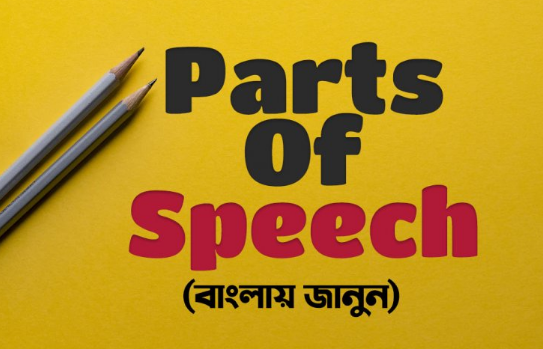Parts of Speech in Bangla
আমরা sentence-এ বিভিন্ন word বা শব্দ ব্যবহার করি। সব শব্দের অর্থ এক নয়, সব শব্দের অর্থ এক জাতীয় নয়।যেমন : Nafiz is a good boy who respects his teachers.
উপরের sentence-টিতে ব্যবহৃত প্রতিটি শব্দই ভিন্ন জাতীয় এবং প্রত্যেকটিই ভিন্ন ভিন্ন অর্থ প্রকাশ করে। একটি বাক্যে বিভিন্ন অর্থ প্রকাশক শব্দ ব্যবহার করি বলেই আমরা একটিমাত্র বাক্যে অনেক রকমের ভাব ফুটিয়ে তুলতে পারি। কাজের বিভিন্নতার ওপর ভিত্তি করে ইংরেজি ভাষায় ব্যবহৃত শব্দগুলােকে ভিন্ন ভিন্ন শ্রেণীতে ভাগ করা হয়েছে। এই ভিন্ন ভিন্ন শ্রেণীর প্রত্যেক ভাগকেই এক একটি Parts of Speech বলে।
Words are divided into different kinds of classes, called parts of speech according to their use, that is according to the work they do in the sentence.
👉 CLASSIFICATIONS OF PARTS OF SPEECH
Parts of Speech আট প্রকার। যথা :
(1) Noun (বিশেষ্য)
(2) Pronoun (বিশেষ্য)
(3) Adjective (বিশেষণ)
(4) Verb (ক্রিয়া)
(5) Adverb (ক্রিয়া-বিশেষণ)
(6) Preposition (পদান্বয়ী অব্যয়)
(7) Conjunction (সমুচ্চয়ী অব্যয়)
(8) Interjection (ভাবসূচক অব্যয়)
(1) Noun : যে word দ্বারা কোন ব্যক্তি, বস্তু, প্রাণী বা স্থানের নাম অথবা গুণের নাম বুঝায়, তাকে Noun বলে। Examples :
- Name of human : Hasan, Sabina, Karim etc..
- Name of the object: Book, pen, chair, table, etc. Name of place: Dhaka, Barisal, Bangladesh, etc.
- Name of the action: Hesitation, function, purification, etc.
- Name of quality: Honesty, wisdom, beauty, etc.
Examples in a sentence :
(a) Dhaka is the capital of Bangladesh.
(b) Ruhul is the best boy in our class.
(c) Honesty is the best policy.
(d) Milk is a nutritious food.
(e) The horse is a faithful animal.
উপরের sentence-গুলােতে মােটা হরফের word-গুলাে দ্বারা কোন ব্যক্তি, বস্তু, প্রাণী, থান বা গুণের নাম প্রকাশ পাচ্ছে। তাই এদের প্রত্যেকটিই এক একটি Noun.
(2) Pronoun: Noun-এর পরিবর্তে যে সব word ব্যবহৃত হয়, তাদেরকে Pronoun বলে। Examples: I, we, you, he, she, they, etc.
Examples in a sentence: Ripon is a good boy; he goes to school regularly.
উপরের sentence-টিতে ‘Ripon’ এই Noun-টির পরিবর্তে ‘he’ ব্যবহৃত করা হয়েছে। তাই ‘he’ হচ্ছে Pronoun.
(3) Adjective: যে word দ্বারা Noun বা Pronoun-এর দোষ, গুণ, অবস্থা, সংখ্যা বা পরিমাণ প্রকাশ পায়, তাকে Adjective বলে। Examples: Good, bad, beautiful, honest, big, small, rich, poor, first, second, etc. Examples in a sentence :
(a). Samira is a beautiful girl.
(b) Rahul wore a blue shirt.
(c) He has much money.
(d) It cost fifty taka to buy this pen.
(e) You are a naughty boy.
উপরের sentence-গুলােতে মােটা হরফের word-গুলাে দ্বারা দোষ, গুণ, অবস্থা, পরিমাণ বা সংখ্যা প্রকাশ পাচ্ছে, তাই এরা হচে Adjective.
(4) verb: যে word দ্বারা কোন কাজ হওয়া বা করা বুঝায়, তাকে verb বলে। Examples: Read, write, come, go, take, give, sing, dance, see, tell, say, etc.
Examples in a sentence :
(a) The boy goes to school.
(b) The girl sings a song.
(c) The fishermen catch fish in the river.
(d) Dhaka stands on the Buriganga.
(e) I am a student of class 9.
উপরের sentence-গুলােতে মােটা হরফের word-গুলাে দ্বারা কোন কাজ করা বা হওয়া প্রকাশ পাচ্ছে। তাই এরা Verb.
(5) Adverb: a Word, Noun, Pronoun 1 Interjection Too ONU QCPA Parts of Speech-CP modify er, তাকে Adverb বলে। Examples: Slowly, sweetly, nicely, there, friendly, always, etc. Examples in a sentence :
(a) I always speak the truth.
(b) He sometimes comes to our house.
(c) Water is very essential for life.
উপরের প্রথম sentence-এ ‘always’ শব্দটি ‘speak’-এই verb-টিকে; দ্বিতীয় sentence-এ ‘sometimes’ শব্দটি ‘comes’ এই verb-টিকে এবং তৃতীয় sentence-এই ‘very’ শব্দটি ‘essential’-এই adjective-কে modify করেছে। তাই উক্ত sentence- always, sometimes a very 2 Adverb.
(6) Preposition : যে word কোন Noun বা Pronoun-এর পূর্বে বসে উক্ত noun বা pronoun-এর সঙ্গে sentence-এর অন্তর্গত অন্য কোন word-এর সম্পর্ক প্রকাশ করে, তাকে Preposition বলে।
Examples: In, at, to, by, for, from, of, off, etc. Examples in the sentence :
(a) Put the pen on the table.
(b) They are digging soil in their field.
উপরের প্রথম sentence-এ ‘on’ শব্দটি pen ও table এই noun দুটির মধ্যে এবং দ্বিতীয় sentence-এ ‘in’ শব্দটি ‘they’ pronoun-টির সাথে ‘field’ noun-টির সম্পর্ক স্থাপন করেছে। তাই এখানে on ও in হচ্ছে Preposition.
(7) Conjunction: যে word দুই বা ততােধিক word, phrase বা clause-এর মধ্যে সংযােগ স্থাপন করে, তাকে Conjunction বলে। Examples: And, but, because, however, as, if, unless, until, till, etc. Examples in a sentence :
(a) Halim and Selim are friends.
(b) He was late at school because it had been raining.
উপরের প্রথম sentence-এ ‘and’ শব্দটি Halim ও Selim-এই word দুটিকে এবং দ্বিতীয় sentence-এ ‘because’ শব্দটি ‘he was late’ এবং ‘it had been raining’—এই clause দুটিকে যুক্ত করেছে। তাই এখানে and ও because হচ্ছে Conjunction.
(৪) Interjection : যে word মনের আকস্মিক ভাবাবেগ প্রকাশ করে, তাকে Interjection বলে। Examples : Alas! Hurrah! Hush! Bravo! etc.
Examples in a sentence :
(a) Alas! He is no more.
(b) Hurrah! We have won the game.
(c) Hush! The child is sleeping.
উপরের sentence-গুলােতে alas, hurrah ও hush দ্বারা মনের আকস্মিক ভাব প্রকাশ পাচ্ছে। তাই এরা হচ্ছে Interjection.
